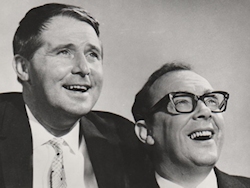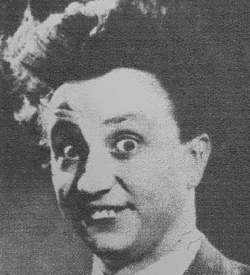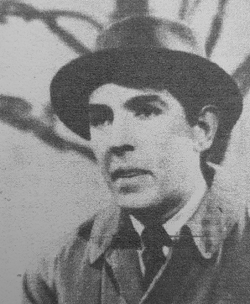Serious Business... This Comedy
1964 Article

Eric and Ern

Ken Dodd

Peter Cook
Humour is as a high flood in Britain today. So it seems a good time to look at comedy in Britain today, and in The Laughter Makers we shall be looking – and laughing at it through the eyes of six of the funniest men in the business.
Peter Cook, first in the series, has amazingly catholic tastes. His favourite character is E.L.Wisty, the park bench philosophist he brought from “Beyond The Fringe” to a regular spot in The Braden Beat, but if you’re addicted to Cook’s wit you would believe he is a mad ventriloquist.
His other passion is the bus conductor… it could be said that Cook is never himself, if only to protect his privacy through assuming a character. Appearing on TV as himself terrifies him. “That’s why I’ll put on strange voices and try to turn myself into other people.”
Cook never performs other people’s material. Most comedians have to, though most of them, like Ken Dodd, try to create as much of their own as they can. Cook, I suppose, could be considered the successful amateur; Dodd who started life heaving coal, the strict professional.
Dodd dislikes what he calls “the student humour” which gets what he thinks is too much of an airing on television. He believes humour should be emotionally light-hearted, hates what he calls “malicious” comedy which gets laughs at the expense of others. Most of the top laughter-makers are great worriers, acutely conscious that the higher you are, the farther you fall. Brian Rix, for instance, never stops polishing a character through all the long runs of his farces at the Whitehall Theatre.
He was once a capable Shakespearean actor, but ever since “Reluctant Heroes” hit the jackpot 15 years ago, he has been drawing in queues by losing his drawers in the earthiest, earliest form of comedy.
Rix feels there is a cruel streak through all humour. He gets his laughs by playing all his parts with deadly earnestness. His characters may be exaggerated, but they remain credible people, reacting to the kind of situations anyone can meet in real life.
Rix, like most funny men, has violent likes and dislikes when it comes to other funny men. He will roll in the aisle for someone like Tommy Cooper, but he will switch off any stand-up comic with a phoney, ingratiating smile before he’s started his warm-up patter.
Morecambe and Wise, in my opinion the top double act in the country today, were together in their early teens as discoveries in a touring show, cracking jokes they still remember and now love to hate.
They remember, too, how they got their first rise – which gave them £7 a week each – when Morecambe’s mother travelled down from Lancashire to London and personally informed Jack Hylton that they would be leaving his organisation unless he forked out an extra pound.
Morecambe & Wise believe that comedians must lead the public gradually towards better quality humour – or else be prepared to lose the audience.
Anybody who sees samples of vintage Morecambe & Wise in The Laughter-Makers will understand what they are talking about when they discuss their progress.
The last name in the series I am sitting on for now – negotiations are still in the trans-Atlantic pipeline.
Six comedians in five shows with one thing in common. When it comes to discussing what makes the public laugh, they can talk for hours. I imagine they will all have to be faded out.
© TV Times 1964